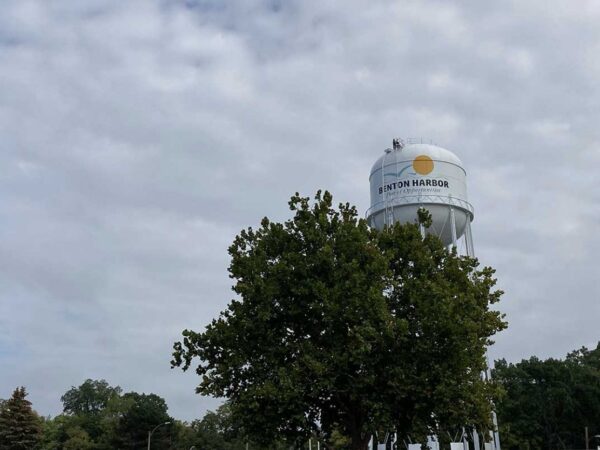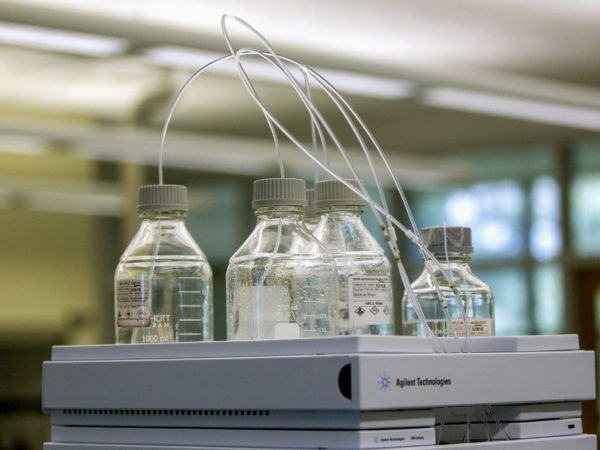
By Lindsey Smith, Michigan Radio
The Great Lakes News Collaborative includes Bridge Michigan; Circle of Blue; Great Lakes Now at Detroit Public Television; and Michigan Radio, Michigan’s NPR News Leader; who work together to bring audiences news and information about the impact of climate change, pollution, and aging infrastructure on the Great Lakes and drinking water. This independent journalism is supported by the Charles Stewart Mott Foundation. Find all the work HERE.
The U.S. Environmental Protection Agency says its study on Benton Harbor’s tap water shows filters do work to remove lead, but the EPA says residents should follow state health guidance, and still only drink bottled water.
It’s a mixed message, but lead isn’t the only lingering water quality concern. Last fall inspectors found several violations at Benton Harbor’s water treatment plant, especially related to disinfection.
“Recent inspections show that the priority operational problems have been fixed,” the EPA wrote on its Benton Harbor update page.
“EPA and Michigan Environment, Great Lakes and Energy (EGLE) will continue to work closely to monitor the system to help prevent new problems and identify additional opportunities to strengthen operations.”
Free bottled water is available for the residents of Benton Harbor. For a list of distribution sites and times, or to get water delivery for homebound residents, click here or call 2-1-1.
People on Benton Harbor water shouldn’t use their tap water to cook, rinse food, brush their teeth, or mix baby formula.

Infographic from Michigan Department of Health and Human Services. (Photo Credit: MDHHS)
The EPA studies included samples from nearly 200 Benton Harbor homes. Results show when filters were used properly, they were able to remove lead to less than 5 parts per billion (ppb). 5 ppb is the certification standard for drinking water filters. There is no safe level of lead in drinking water.
“However, the Agency found residents need better information to install and operate filters properly. EPA plans to support the state of Michigan and local governments to disseminate information about the safe and effective use of filters,” the update said.
Lead levels in Benton Harbor’s drinking water have recently shown some signs of improvement, but have been continuously elevated since 2018.
Citing lead levels and other concerns at the city’s water treatment plant, a coalition of national and local groups called on the EPA last fall to use its emergency powers to provide bottled water and other actions. Soon after, the state started offering free bottled water and vowed earlier this year to continue providing bottled water while lead water pipes are being replaced in the city.
“Since bottled water has been appreciated by the community and has helped address families’concerns about lead exposure, we are continuing to provide bottled water throughout the lead service line replacement project. Berrien County Health Department has filters available free of charge for residents who wish to use filters, “MDHHS spokeswoman Lynn Sutfin wrote in an email.
A data dashboard shows 10% of an assumed 4,300 lead service lines in Benton Harbor had been replaced by the end of February. Governor Gretchen Whitmer ordered all lead lines replaced by spring of 2023.
Disinfection treatment, water plant problems are also a factor
During a September inspection of the city’s water plant, EPA and state environmental regulators found major violations, relating not only to lead but also to important disinfection treatment. Disinfection chemicals are added to prevent harmful bacteria like legionella, cryptosporidium and giardia from growing and developing in the water once it leaves the treatment plant.
Inspectors found the plant’s chlorine treatment monitoring equipment was broken. Staff weren’t sampling often enough to make sure chlorine was at the right level and had bad record keeping on how much chemical treatment they used.
After that inspection, the EPA ordered the city to correct a number of violations of the Safe Drinking Water Act and complete a study “to address significant technical, managerial, and financial deficiencies.”
“EPA’s looking at the total pictures combined,” Tera Fong, Director of EPA’s Water Division in Region 5’s Office, previously told Michigan Radio.
“We do want to make sure we understand and are able to convey to the public the overall state of the water system in Benton Harbor,” Fong previously said.
On Friday, Fong confirmed there was a follow up inspection at the water plant last month, and that the results should be released to the public within a few weeks.
Catch more news on Great Lakes Now:
Work continues on removing lead water lines in Benton Harbor
Should Benton Harbor residents have to pay for water they can’t drink?
Featured image: Workers in Benton Harbor work in November, 2021 to locate lead water pipes. (Lindsey Smith/Michigan Radio)




